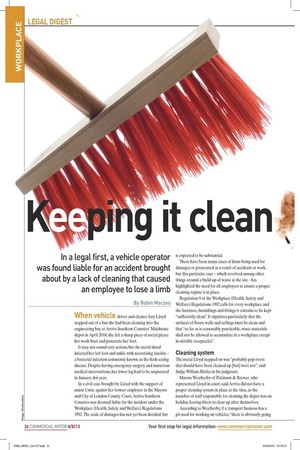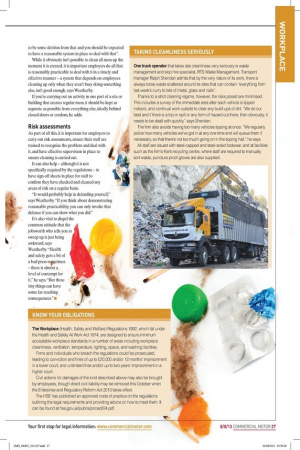it clean •
Page 21

Page 22

If you've noticed an error in this article please click here to report it so we can fix it.
In a legal first, a vehicle operator was found liable for an accident brought about by a lack of cleaning that caused an employee to lose a limb By Robin Meczes
When vehicle driver and cleaner Izzy Lloyd stepped out of a bus she had been cleaning into the engineering bay at Arriva Southern Counties' Maidstone depot in April 2010, she felt a sharp piece of metal pierce her work boot and penetrate her foot.
It may not sound very serious, but the metal shard infected her left foot and ankle with necrotising fasciitis — a bacterial infection commonly known as the flesh-eating disease. Despite having emergency surgery and numerous medical interventions, her lower leg had to be amputated in January this year. In a civil case brought by Lloyd with the support of union Unite against her former employer at the Mayors and City of London County Court, Arriva Southern Counties was deemed liable for the incident under the Workplace (Health, Safety and Welfare) Regulations 1992. The scale of damages has not yet been decided, but
is expected to be substantial.
There have been many cases of firms being sued for damages or prosecuted as a result of accidents at work, but this particular case — which revolved among other things around a build-up of waste at the site has highlighted the need for all employers to ensure a proper cleaning regime is in place.
Regulation 9 of the Workplace (Health, Safety and Welfare) Regulations 1992 calls for every workplace and the furniture, furnishings and fittings it contains to be kept "sufficiently clean". It stipulates particularly that the surfaces of floors, walls and ceilings must be clean and that "so far as is reasonably practicable, waste materials shall not be allowed to accumulate in a workplace except in suitable receptacles".
Cleaning system
The metal Lloyd stepped on was "probably pop rivets that should have been cleaned up [but] were not", said Judge William Birtles in his judgment.
The metal Lloyd stepped on was "probably pop rivets that should have been cleaned up [but] were not", said Judge William Birtles in his judgment.
Marcus Weatherby of Pattinson & Brewer, who represented Lloyd in court, said Arriva did not have a proper cleaning system in place at the time, as the member of staff responsible for cleaning the depot was on holiday, leaving fitters to clear up after themselves. According to Weatherby, if a transport business has a pit used for working on vehicles, "there is obviously going
to be some detritus from that and you should be expected to have a reasonable system in place to deal with that".
While it obviously isn't possible to clean all mess up the moment it is created, it is important employers do all that is reasonably practicable to deal with it in a timely and effective manner — a system that depends on employees cleaning up only when they aren't busy doing something else, isn't good enough, says Weatherby.
If you're carrying out an activity in one part of a site or building that creates regular mess, it should be kept as separate as possible from everything else, ideally behind closed doors or cordons, he adds.
Risk assessments
As part of all this, it is important for employers to carry out risk assessments, ensure their staff are trained to recognise the problem and deal with it, and have effective supervision in place to ensure cleaning is carried out.
As part of all this, it is important for employers to carry out risk assessments, ensure their staff are trained to recognise the problem and deal with it, and have effective supervision in place to ensure cleaning is carried out.
It can also help — although it is not specifically required by the regulations — to have sign-off sheets in place for staff to confirm they have checked and cleaned any areas of risk on a regular basis.
It can also help — although it is not specifically required by the regulations — to have sign-off sheets in place for staff to confirm they have checked and cleaned any areas of risk on a regular basis.
"It would probably help in defending yourself," says Weatherby. "If you think about demonstrating reasonable practicability, you can only invoke that defence if you can show what you did." It's also vital to dispel the common attitude that the jobsworth who tells you to sweep up is just being awkward, says Weatherby. "Health and safety gets a bit of a bad press sofictimes — there is almost a level of contempt for it," he says. "But these tiny things can have some far-reaching consequences." • common attitude that the jobsworth who tells you to sweep up is just being awkward, says Weatherby. "Health and safety gets a bit of a bad press sofictimes — there is almost a level of contempt for it," he says. "But these tiny things can have some far-reaching consequences." • common attitude that the jobsworth who tells you to sweep up is just being awkward, says Weatherby. "Health and safety gets a bit of a bad press sofictimes — there is almost a level of contempt for it," he says. "But these tiny things can have some far-reaching consequences." •









































